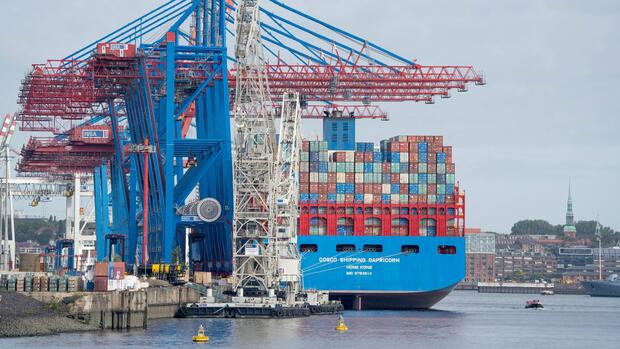Berlin/Hamburg The CDU and CSU want to protect the maritime economy and use instruments similar to those used by the American government to strengthen production in the areas of energy and climate protection. In a motion, the largest opposition faction in the Bundestag calls on the government to link European funding programs for the construction of new ships to “binding value-added clauses or clauses on production in the EU”.
Likewise, the CDU and CSU plead for a European fleet renewal program “which is implemented by the European shipbuilding industry and in the EU represents Europe’s clear response to the state distortions of competition caused by Asia”.
With its initiative, the Union is addressing the concerns of the industry. According to the Shipbuilding and Marine Technology Association (VSM), more than half of all orders for civilian ships went to China last year. Shipyards in South Korea received almost 40 percent of the orders.
The Union’s demand is part of a 95-point catalog of measures by the CDU and CSU, which the Bundestag will discuss right at the beginning of its session this Thursday. The application has been submitted to the Handelsblatt. It includes the requirement to “adapt” fairways to the seaports, be it on the Outer Weser or the Lower Weser and the Ems. The Union does not call for the Elbe to be deepened, but instead at least “to ensure the target depths in the Elbe fairway”.
In principle, important measures should be declared to be of overriding public interest. The Bundestag is deliberating on a corresponding acceleration law. At the urging of the Greens, it has so far not provided for any prominent position for shipping projects. The FDP is still trying to achieve changes.
The CDU and CSU justify their move with the crisis in which the industry with its around 200,000 employees is. The German seaports – above all Hamburg – are increasingly losing market share to the competition in Rotterdam and Antwerp.
The Polish ports and those in the Mediterranean are also causing problems for the domestic seaports. In 2022, goods handling in Germany fell by 3.2 percent to a total of 279.1 million tons compared to the previous year, while container handling fell by 6.3 percent. Measured against the pre-crisis level of 2019, the tonnage fell by 4.9 percent. In particular, the loss of Russian ship transport across the Baltic Sea affects Germany’s seaports.
Excessive handling costs in the seaports, the corona pandemic and the Ukraine war have exacerbated the crisis. “We are hearing alarm signals from all sectors of the maritime economy,” said Michael Grosse-Brömer, Chairman of the Economic Committee, to the Handelsblatt. The CDU politician called on the traffic light coalition to “finally take countermeasures” and to support the maritime economy with a “measures offensive”. This should also include federal guarantees.
Infrastructure for autonomous ships
The CDU/CSU are also calling for a nationwide 5G network to be created along the waterways, at ports and in coastal areas, “because this is a central basis for the development of autonomous shipping”. They also propose “upgrading the German ports” and expanding them into the “hub of the energy transition”.
This includes liquid gas and hydrogen terminals and also the possibility of expanding services for wind farms at sea (offshore). In many cases, federal guarantees should be possible to secure projects such as huge substations at sea.
>> Read here: How Antwerp became the gateway for cocaine in Europe
So far, there has been a lack of public support in this area. Because German courts stopped corresponding plans in Bremerhaven and the necessary expansion in Cuxhaven is progressing slowly, Germany’s neighboring countries are now winning the race for offshore services. In Esbjerg in Denmark and Eemshaven in the Netherlands in particular, overwhelming competition has gathered.
Public funds in Germany, on the other hand, flow primarily into the domestic shipyard industry – in particular to secure jobs in the mostly structurally weak areas. Germany’s shipyard industry, which specializes in the construction of cruise ships, went into a tailspin due to cancellations during the corona pandemic. The state jumped in with extensive financial aid.
Location disadvantage due to German tax laws
On the other hand, there is a demand from the maritime industry that would cost the German tax authorities significantly less: the Central Association of German Seaport Companies (ZDS), together with numerous chambers and logistics providers, is demanding that the rules for German import sales tax be changed.
For the seaports and their customers, it is a nuisance that German importers have to pay the sales tax directly when the goods are imported. Only when the goods are resold can they report the amounts to the state tax authorities as input tax in order to be reimbursed if necessary. This regularly deprives importers based in Germany of valuable liquidity.
Because neighboring countries such as the Netherlands, Belgium or Poland only levy the import sales tax when the imported goods are resold, which experts call a “billing model”, German ports have had a real locational disadvantage for years. “Many companies think twice about importing products into the EU via Germany when it’s easier and more attractive in the neighboring countries,” observes ZDS CEO Daniel Hosseus.
The Union faction has taken up the demand and also calls for “reforming the import sales tax to the so-called offsetting model in order to avoid competitive disadvantages for the German seaports”.
More: Federal government allows Chinese shipping company Cosco to participate in Hamburg terminal
